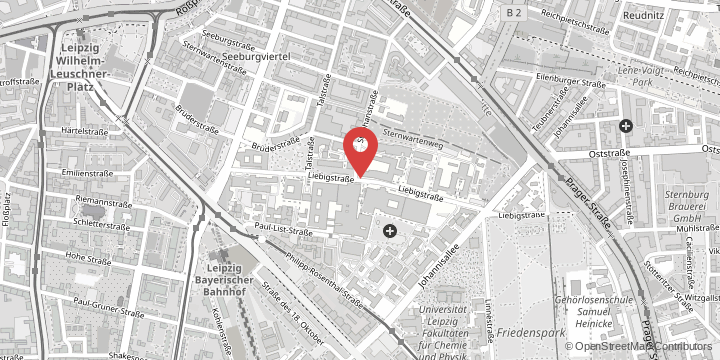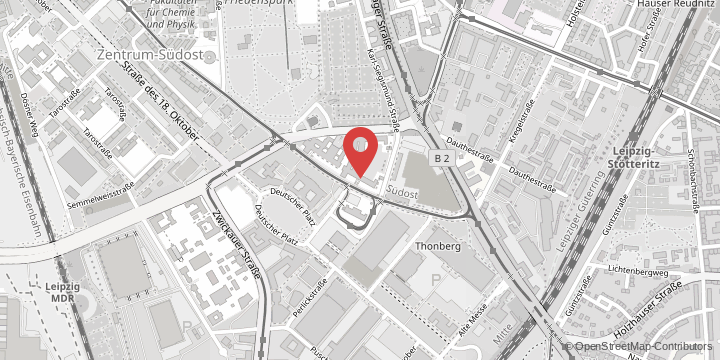Profile
Abstract
Prof. Wirth is a plant ecologist who studies how natural and human-induced changes in plant biodiversity affect ecosystem processes such as carbon storage, water consumption and energy balance. He is the founding director and spokesperson of the DFG Center iDiv, director of the Botanical Garden and leader of the AG Special Botany of Leipzig University. After studying plant ecology at the University of Bayreuth, his initial interest was in the carbon cycle and fire ecology. Hence, he developed mainly trait-based approaches to study the relationship between biodiversity and ecosystem functions in forest and grassland ecosystems, establishing the TRY database of functional plant traits. His most recent research is based on forest conservation, floodplain and canopy ecology (Leipzig Canopy Crane), and the impact of climate change on forest biodiversity and ecosystem services. He is currently leading the national biodiversity assessment (BMBF “Faktencheck für den Erhalt der Artenvielfalt”).
Professional career
- since 10/2012
Managing director / Speaker of the German Centre for Integrative Biodiversity Research (iDiv) Halle-Jena-Leipzig (DFG FZT 118) - since 11/2009
Managing director of the Botanical Garden of the University of Leipzig - since 11/2009
Full professor (W3) at University of Leipzig; head of department “Systematic Botany and Functional Biodiversity”, Institute of Biology - 04/2009
Offer of professorship (W2) from University of Giessen (declined) - 03/2005 - 10/2009
Leader of Independent Junior Research Group “Organismic Biogeochemistry” at the Max-Planck-Institute for Biogeochemistry, Jena - 03/2003 - 02/2005
Post-doctoral research scientist in the lab of Prof. Stephen W. Pacala, Department of Ecology and Evolutionary Biology, Princeton University, USA (Research fellowship funded by the German Science Foundation) - 06/2004 - 09/2004
Visiting scientist at the Institute of Arctic Biology in the lab of Prof. F. Stuart Chapin III, University of Fairbanks, Alaska, USA - 08/2003 - 09/2003
Visiting scientist at the Sukachev Institute for Forest in the lab of Prof. Evgeny Vaganov, Siberian Branch of the Academy of Sciences, Krasnoyarsk, Russia - 01/2000 - 02/2003
Post-doctoral research scientist at Max-Planck-Institute for Biogeochemistry, Jena; BMBF project: “Carbon accounting in Thuringian’s forests – A German case study on implementing the Kyoto protocol” - 10/1997 - 02/1998
Scientific assistant at plant ecology lab, University of Bayreuth, Germany - 09/1988 - 05/1990
Civil Service at Nature Conservation Association "Biologische Schutzgemeinschaft Hunte-Weser-Ems e.V", Wardenburg, Germany
Education
- 10/1990 - 05/1996
Study of Biology with Diploma (“with distinction”) with title „Aboveground biomass, nitrogen balance and populations dynamics in chronosequence of Siberian Scots pine forests“, University of Bayreuth, Germany - 06/1996 - 05/2000
PhD (“summa cum laude”); Title: „The impact of fire on the carbon dynamics in Siberian Scots pine forests. Interactions of biogeochemistry and population ecology“ (Professor Dr. Ernst-Detlef Schulze) University of Bayreuth, Germany
Panel Memberships
- 10/2012 - 09/2020
Member of DFG Review Board ‘Plant Sciences’ - since 02/2020
Member of working group for conservation and restauration of floodplain ecosystems of the Ministry of Environment of the Freestate of Saxony - since 06/2016
Member of the Scientific Advisory Board of National Park Hainich, Thuringia, Germany - since 07/2014
Member of the Permanent Senate Commission on Fundamental Issues of Biological Diversity of the German Research Foundation (DFG) - since 06/2007
Steering committee member of the TRY database of functional plant traits - 05/2011 - 04/2015
Vice-Dean of the Faculty of Life Sciences of the University of Leipzig - 01/2010 - 08/2015
EU FunDivEUROPE: Steering committee and work package leader - 03/2010 - 02/2014
Member of the Senate of the University of Leipzig
- show detailsNFDI4BioDiversity: Biodiversity, Ecology & Environmental DataMahecha, MiguelDuration: 01/2021 – 12/2026Funded by: DFG Deutsche ForschungsgemeinschaftInvolved organisational units of Leipzig University: Umweltdatenwissenschaften und Fernerkundung; Spezielle Botanik und funktionelle Biodiversität
- show details"GFBio III"Buscot, François ClaudeDuration: 04/2019 – 03/2022Funded by: DFG Deutsche ForschungsgemeinschaftInvolved organisational units of Leipzig University: Bodenökologie (Gemeinsame Berufung mit UFZ)
- show detailsRare for a reason? – Scale dependence of determinants of rarity and diversity of xylobiont beetlesSchlegel, MartinDuration: 10/2017 – 12/2021Funded by: DFG Deutsche ForschungsgemeinschaftInvolved organisational units of Leipzig University: Molekulare Evolution und Systematik der Tiere; German Centre for Integrative Biodiversity Research (iDiv)
- show detailsQuantifying the Communication Service of BiodiversityWirth, ChristianDuration: 03/2017 – 12/2021Involved organisational units of Leipzig University: Spezielle Botanik und funktionelle Biodiversität
- show detailsBiodiversity Assessment for GermanyWirth, ChristianDuration: 04/2021 – 03/2024Funded by: BMBF Bundesministerium für Bildung und ForschungInvolved organisational units of Leipzig University: Institut für Biologie; Spezielle Botanik und funktionelle Biodiversität
- show detailsLanger, L.; Burghardt, M.; Borgards, R.; Böhning-Gaese, K.; Seppelt, R.; Wirth, C.The rise and fall of awareness for biodiversity – A comprehensive quantification of historical changes in the use of vernacular labels for biological taxa in Western creative literaturePeople and Nature. 2021. 3 (5). pp. 1093–1109.DOI: 10.1002/pan3.10256
- show detailsvan der Plas, A.; Schroeder-Georgi, T.; Weigelt, A. et al.Plant traits alone are poor predictors of ecosystem properties and long-term ecosystem functioningNature Ecology & Evolution. 2020. 4 (12). pp. 1602–1611.
- show detailsMarra, D.; Trumbore, S. E.; Higuchi, N.; Ribeiro, G. H. P. M.; Negron-Juarez, R. I.; Holzwarth, F.; Rifai, S. W.; dos Santos, J.; Lima, A. J. N.; Kinupp, V. F.; Chambers, J. Q.; Wirth, C.Windthrows control biomass patterns and functional composition of Amazon forestsGlobal Change Biology. 2018. 24 (12). pp. 5867–5881.DOI: 10.1111/gcb.14457
- show detailsRüger, N.; Comita, L. S.; Condit, R.; Purves, D.; Rosenbaum, B.; Visser, M. D.; Wright, S. J.; Wirth, C.Beyond the fast-slow continuum: demographic dimensions structuring a tropical tree communityEcology Letters. 2018. 21 (7). pp. 1075–1084.DOI: 10.1111/ele.12974
- show detailsSchnabel, F.; Purrucker, S.; Schmitt, L.; Engelmann, R.; Kahl, A.; Richter, R.; Seele-Dilbat, C.; Skiadaresis, G.; Wirth, C.Cumulative growth and stress responses to the 2018–2019 drought in a European floodplain forestGlobal Change Biology. 2021. 28 (5). pp. 1870–1883.DOI: 10.1111/gcb.16028
-
11-BIO-0208 Systematic Botany and Vegetation Ecology (Bachelor)
As part of this course, we offer some lectures on plant ecology but are mainly involved in the practical teaching during individual short excursions in the vicinity of Leipzig and the 1-week field course (Geländepraktikum). During the field course, we teach plant determination but also some basic ecological field methods, hypothesis testing, and data analysis.
-
11-BIO-0635 Vegetation ecology and plant geographie (Bachelor)
Here we provide a global overview of the determinants of plant life and the resulting vegetation types and ecosystems. We place special emphasis on understanding vegetation processes and material cycles on a global scale. The practical course focuses on field methods and analytical procedures of descriptive and quantitative vegetation science.
-
11-BIO-0523 Introduction to Ecology (Bachelor)
This module introduces the theoretical basis and applications of ecological concepts. The lecture covers the chapters of the classic Begon & Townsend book on Ecology. In the seminar, we critically discuss individual examples of these same chapters based on scientific papers. The lab course covers the basics of scientific work from the research question to practical implementation and measurement to data analysis and presentation.
-
11-BIO-0515 Introduction to methods and scientific work (Bachelor)
This module consists of two seminars: (1) the Research seminar of the group Wirth/Weigelt and the group Müllner-Riehl where PhDs and postdocs from our groups and some invited guests present their latest findings; (2) a literature seminar in our group where we teach critical reading and discussion of scientific paper based on selected examples on changing ecological topics.
-
11-BIO-209 Biodiversity and Ecosystem Functioning in terrestrial systems (Master)
This module offers detailed insight into the relationship between different facets of diversity and important ecosystem functions. In addition to the profound background on biodiversity sciences presented in the lecture, the course teaches experimental and analytical skills in the glasshouse, lab and field, data analysis and presentation and critical evaluation of scientific literature
Research fields
Biology, Environment, environmental protection, ecology
Specializations
- Biodiversität und Ökosystemfunktionen
- Funktionelle Diversität von Waldbäumen und Wäldern
- Verbindung von Populationsökologie und Biogeochemie
- Störungsökologie
- Dynamik von Zersetzungsprozessen
- Naturwaldforschung
- Allometrie und Allokation
- “Diversifizierung” von Erdsystemmodellen
- Auwald, Artenvielfalt
- Baum, Botanik, Pflanzen
- Ökologie
Contact for media inquiries
Phone: +49-341-97-38590































































